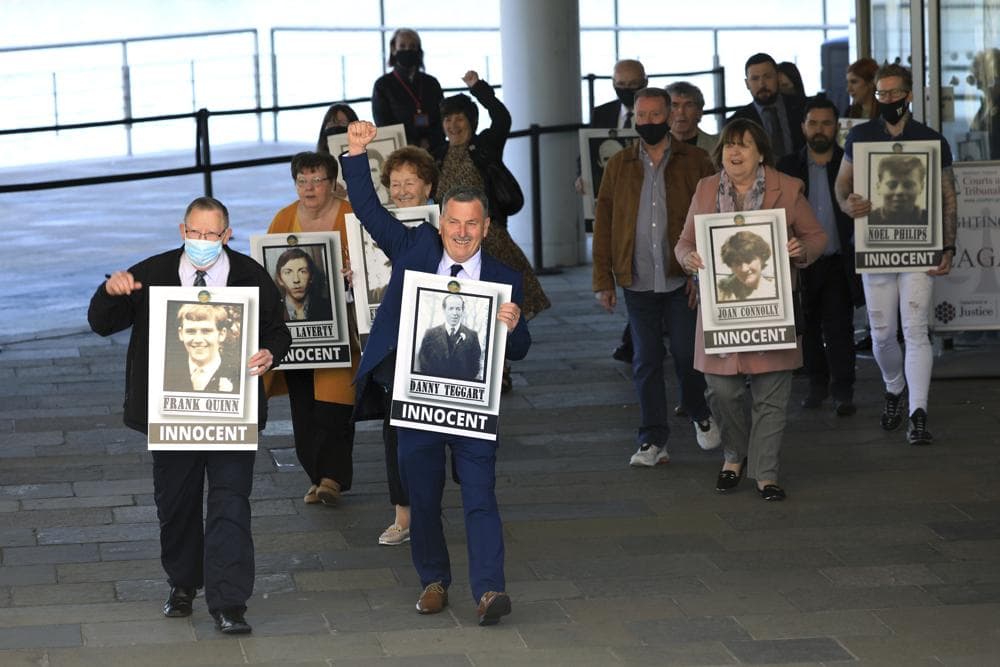LEICESTER, United Kingdom – An announced end to all prosecution of Northern Ireland Troubles-related violence would give “blanket impunity” for the perpetrators of human rights abuses, according to experts from the United Nations.
Brandon Lewis, the UK Secretary of State for Northern Ireland, in July announced the introduction of a statute of limitations for all sides involved in the Troubles, the 30-year conflict between the British security forces and Unionist paramilitary groups against the Irish Republican Army and related Nationalist groups.
The conflict largely came to an end with the 1998 Good Friday Agreement, which established a power-sharing government in Belfast.
Lewis said introducing a statute of limitations is “the best way to help Northern Ireland move further along the road to reconciliation.”
“We know that the prospect of the end of criminal prosecutions will be difficult for some to accept, and this is not a position that we take lightly,” he said. “But we have arrived at the view that this would be the best way to facilitate an effective information retrieval and provision process, and the best way to help Northern Ireland move further along the road to reconciliation. It is a painful recognition of the reality of where we are.”
The minister added it would also facilitate a truth and reconciliation process to provide answers for those affected by the violence.
However, on Aug. 10, two experts at the UN expressed “grave concern” about the plan, saying it “forecloses the pursuit of justice and accountability for the serious human rights violations committed during the troubles and thwarts victims’ rights to truth and to an effective remedy for the harm suffered, placing the United Kingdom in flagrant violation of its international obligations.”
The experts are Fabián Salvioli, the Special Rapporteur on the promotion of truth, justice, reparation and guarantees of non-recurrence, and Morris Tidball-Binz, the Special Rapporteur on extrajudicial, summary or arbitrary executions.
The two warned against conflating reconciliation with impunity.
“The essential components of a transitional justice approach – truth, justice, reparation, memorialization and guarantees of non-recurrence – cannot be traded off against one another in a ‘pick and choose’ exercise,” the UN officials said.
“The proposed plan does not seem to include measures for establishing the full extent of the truth about the human rights violations perpetrated during the Troubles and about the circumstances, reasons and responsibilities that led to them,” Salvioli and Tidball-Binz continued. “Nor does the proposal seem to ensure that this truth is accessible to all victims and to society as a whole, with due consideration of the needs and safety of victims and with their full consent, as established in international standards.”
The two experts also expressed concern at “the lack of clarity concerning the role that victims will play in the design, implementation and monitoring of the proposed transitional justice institutions and measures, including those relating to memorialization, archiving and truth recovery, and how their full and effective participation will be guaranteed.”
The experts urged the British authorities to “refrain from regressing on their international human rights obligations through the establishment of a statute of limitations for conflict-related prosecutions and barring all related investigations, inquests and civil claims.”
The plan has been criticized by both the leading Unionist and Nationalist parties in Northern Ireland.
“Victims will see these proposals as perpetrator-focused rather than victim-focused and an insult to both the memory of those innocent victims who lost their lives during our Troubles and their families,” Jeffrey Donaldson, the leader of the Democratic Unionist Party (DUP).
Deputy First Minister and Sinn Féin vice-president Michelle O’Neill said there “is no room for an amnesty in terms of dealing with the past.”
The proposal has also been criticized by the government of the Republic of Ireland.
“The introduction of what amounts to a general amnesty for all security personnel, and all paramilitaries, for murders and other crimes, up until the Good Friday Agreement is not the right way to go,” said Prime Minister Micheál Martin.
“I don’t believe in a general amnesty for those who committed murder, whether they were state actors, or whether they were involved in terrorist or illegal organizations,” he added.
Archbishop Eamon Martin of Armagh said the UK government proposal was “a betrayal of trust” to victims of Northern Ireland violence.
“Dealing with the legacy of our shared past is not an easy task. It is a complex undertaking which belongs to all of us. It has no ‘quick-fix.’ No ‘line can be drawn’ to relieve the deep hurt still carried in the aftermath of years of violence, death and life-changing injury,” he said in a July statement.
Follow Charles Collins on Twitter: @CharlesinRome















